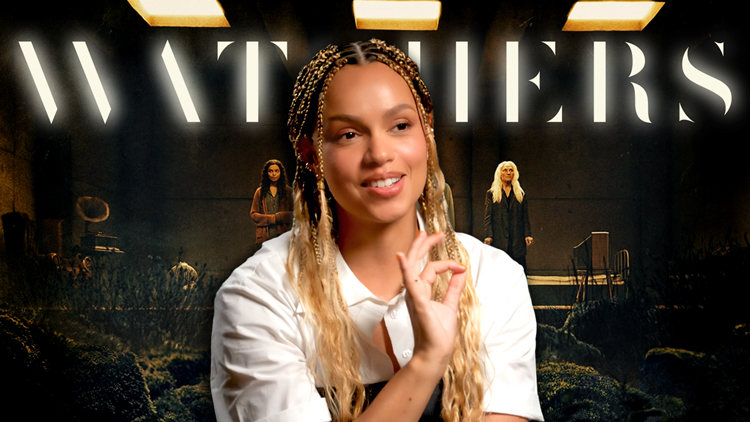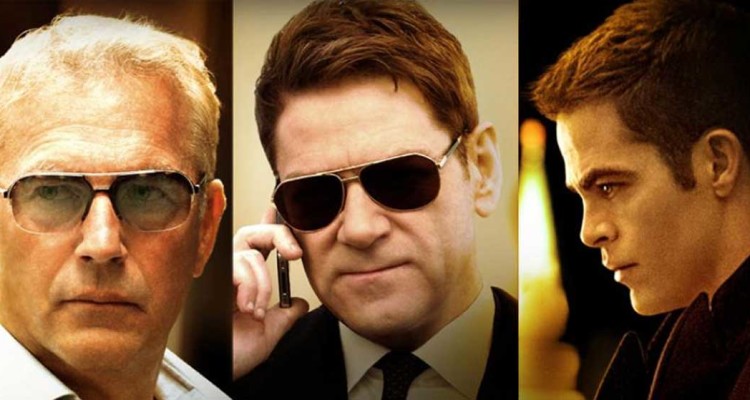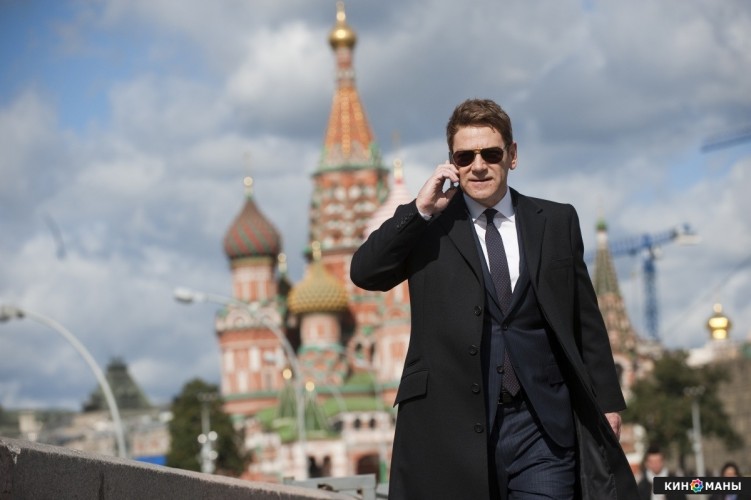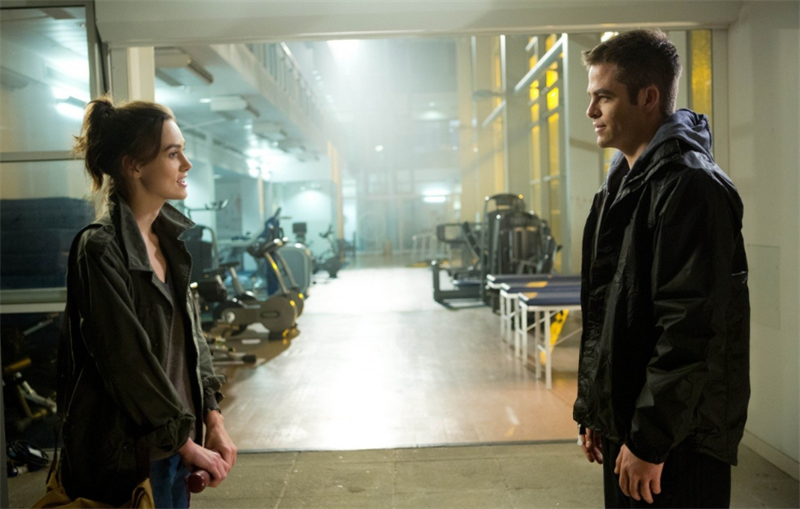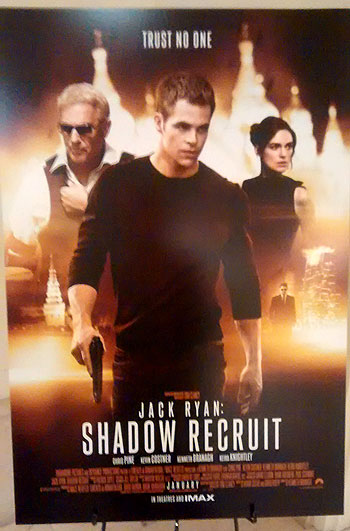“Jack Ryan: Shadow Recruit” will hit theaters this Friday, January 17, to continue the cinematic saga based on the late Tom Clancy’s novels. Last week I had the pleasure of attending the press conference in West Hollywood. Chris Pine, Kevin Costner, director Kenneth Branagh, and producers Mace Neufeld and Lorenzo Di Bonaventura, were present to discuss the new spy thriller and more. Here is the entire exchange so it may containe some minor spoilers.
PRESS: Thanks. Hi. Chris, was this more or less intimidating to step into Jack Ryan’s fabled shoes than to do Star Trek? And for Kevin, you’ve been in Russian spy thrillers before, No Way Out is one of your great movies – how have things changed from the 20th Century to the 21st Century for this form?
CHRIS PINE: Well, I think that the great thing about the Jack Ryan films is that the plot and the story kind of always take center stage and I think if you’ve done your job as the actor portraying Jack Ryan, you are present enough to make an impact, but you kind of let the story shine, and we had a great story that David Koepp came up with and you know, Kirk is obviously – Shatner made such a deep impression, and the Zeitgeist that, it’s just a whole, it’s a different thing entirely.
KEVIN COSTER: I’m still thinking about that century thing you said. [LAUGHTER] I don’t know what’s changed, really. You know, hopefully when our movies are realer, they get realer when they happen to be, you know, the James Bond situation where a guy parachutes in and, you know, that kind of thing. That’s another kind of spy movie. So I don’t know, you know, our job is to entertain and to, you know, find the rhythms that do that, the language of the day, and hopefully that we don’t try to reinvent the wheel, because spies are trying not to get caught, trying to stop bad things, and you know, hopefully the level of sophistication always is going up.
PRESS: Mr. [INDISCERNABLE] Mr. Branagh, this character and this milieu have a sort of very different era historically, culturally, geopolitically. I’m wondering what were the pleasures and challenges of bringing Mr. Ryan into this age, but also what intrinsic parts of a character and a milieu make bringing Mr. Ryan into this age a pleasure and worth doing at the same time.
KENNETH BRANAGH: Well, I loved the previous pictures and the books. I like the Cold War era and the big sort of elemental standoff between, in this case, Russia and America, and east and west and old and new and old empires and new empires. One of the excitements about trying to reimagine it was finding a world, so the interconnectivity of the financial markets was one that was both interesting and a bit of a brain teaser for me. Chris was very good at understanding it, thank god. But to be able to put Jack Ryan there at a time when it was a different kind of elemental face off between Russia and America, and where one tiny event in one part of the world can so, you know, dramatically and catastrophically influence a larger event elsewhere with that same, for me, sort of good principled moral conscioused man in a very much dirtier world. For me, that was pretty interesting, and although Chris is right to say that the story and the plot in these pictures is very important, for me it was a huge, huge pleasure to work with these two great actors, to be able to also follow what also, I think, is a big part of it is watching them think and deal with it in a layered way, the human dimension of the story, as portrayed by these fellows, was a huge pleasure for me in trying to make the movie.
PRESS: Hey, Chris, great job in the movie. So good. How much of your stunts did you do? You know, a big percentage, small? You know, how’d you keep yourself safe through it? Did you every thing you were going to be in jeopardy? And one more, with Star Trek, you’ve always got to be thinking a little franchise potential – do you think this one has it?CHRIS PINE: Yeah, I did plenty of my own stunts. I enjoyed doing them and I think most actors do it. You get to live out kind of boyhood fantasies and you know, people make sure that you’re doing it safely. I was on a very large motorcycle for a lot of the time, which I’m not sure I would probably do again without a helmet on the streets of New York on the first day, but it sure was a lot of fun. The most fun I had I think is the – and one of the best moments in the film, from my point of view – is the scene that I have with the security guy in the bathroom towards the beginning of the film when I first arrive in Russia. And that was – I like – I didn’t get to do much of it in the last Star Trek, I like the kind of hand-to-hand combat stuff, and I like the fact that Jack, as much as he had training in the Marines, isn’t a trained killing professional, and so it was kind of a MacGyver moment of trying to figure out how to defeat the large bad guy when you’re, you know, not quite as big and not quite as ferocious or talented, you know, with your fists. And we had a great stunt team behind us, and [PH] Vic Armstrong who’s been around for a long time and is one of the best in the business was our second unit guy and our stunt coordinator, and that was a lot of fun.
PRESS: Can this become a franchise?
CHRIS PINE: I think, obviously, we’re in a corporate world and we’ll see what Paramount thinks of it and if people like it and people come to see it, and I would love to do it again, and I think what a really interesting time for a spy franchise in 2014. We’ve seen it obviously done in the Cold War in the late 80s and 90s with Harrison and Alec, but I think right now given the interconnectivity of the world, given the kind of – the gray morality of politics and spydom and all that, there’s great, fertile ground to be mined for good stories.
PRESS: Kevin, going back to the last century again, you were originally going to be playing this character, Jack Ryan –
CHRIS PINE: Does that make you feel old?
KEVIN COSTER: “Last century” again? Well, you know, the mentor role is always that – what can you offer a younger man, what can you offer a younger woman, you know, things in your level of experience, and so that by definition is the mentor, if you have a level of experience. But that’s what I was – you know, if you read it on paper, that’s the role that’s meant for me. It was, you know, inhabited it perfectly, Chris did, his role. And what I liked about it was that I wasn’t just a person at a desk on a phone going, “Get the hell out of there. What the hell are you doing? Well, you need to do it faster.” I mean, Kenneth, you know, was able to say, Wait a second, I want to incorporate some of your skill set into this where even though I’m a stupidvisor, if you would, a supervisor here, that I could take the gloves off, so to speak, and become involved and bring a physical presence and team up with him at the right moment. So I thought that was unusual for the mentor role. Usually they’re back in Washington or they’re in a big, giant control room. In this instance, we were always fairly close together and trying to sort it out a little bit together, and as the movie progresses, you see that he just possesses a lot of intuitive skills, you know, whether it’s being how to survive or to process a lot of information in a very quick way, which I actually ask him a couple times to slow down, remembering that I’m in another century. [LAUGHTER]
KENNETH BRANAGH: And I got to, a long time in advance, started to listen to, you know, Russian television, Russian radio. I had a dialect coach who just introduced me to the just the sound of the language. I wasn’t really familiar with all its varieties, its tone is a bit different, a little less range, and then I learnt it phonetically while walking the dog. We have a dog in this movie, the next dog in the next Jack Ryan film, if there is one, will be my dog, who can now speak Russian, [LAUGHTER] so I’m looking forward to seeing her in that.PRESS: Kevin, can you talk a little bit about career longevity, ‘cause you have a bunch of interesting things happening this year and how have you maintained this career, that just always surprises people?
KEVIN COSTER: Well, I would say this, and I think this might come as a surprise: you know, I didn’t make my first check until I was about 27, 28 years old, so I didn’t burst on the scene at 19 or 20. And you know, probably if you think about the guys in my category, I probably have about half the movies that they have, if you kind of added them up. You’d have to look at that. But you know, I had three little kids the last five years, my wife and I, and I slowed down for about three to, you know, get them started, and I’ve had enough of that fuckin’ minivan, [LAUGTHER] and I just had to get a minivan ‘cause my back was killing me with the SUV, three seats and shit, I thought, I have to go back to killing somebody for real or you know, action movies, ‘cause this is too tough. But I did, about the last year and a half, after I did Hatfields and got on a horse again, I started to feel, you know, my love of acting. And so about a year and a half ago I amassed a series of movies that are gonna kind of come out, but that’s unusual for me to go back to back. But longevity for me is not a check, it’s a love, I’ve loved making movies, I’ve loved living my life outside the lines of Hollywood, so when I come to work I like to work, and I like to work with people that are very specific, and all the gentlemen up here are really specific people. I have a history with some and for some it was a first time that I’d like to replicate down the line. So I don’t know, I have been fortunate, blessed, loved, and it’s added up to 30 years.
PRESS: You’re a spy in Three Days to a Kill?
KEVIN COSTER: I’m not a spy. I’m getting really sick and they retire me, so I’m out of the CIA when the movie starts.
PRESS: My question is for Chris, and then Kenneth. Chris, we have so many Jack Ryans movie before this film, so what your like a first Jack Ryan experience, what you kind of [SOUNDS LIKE] saw the film or book or could you talk about that? And Kenneth, you’re a English actor who play Russian and who made a film about CIA. It’s kind of interesting for me, so what did you pay attention to make this film?
CHRIS PINE: I’ve always loved the series, I’ve always loved the spy genre, fiction and films, so I was just kinda well-versed with the Clancy universe, having watched the films growing up, and looking at the character and rewatching the films, I think what I most enjoyed, for me, was the difference that I saw in how Alec portrayed the character and how Harrison portrayed the character, and with Alec in Hunt you have this – what Alec does really well, which is this confident, intelligent, analytical man who knows what he knows and is not afraid to say it, and with Harrison, with his tweed coat and his Volkswagen, you know, Jetta, he’s the humble intellect and he’s the classic what Harrison does best, the classic reluctant hero. And I thought somewhere in that was kind of a great way to begin looking at the character.
KENNETH BRANAGH: And I remember seeing Hunt for Red October when I did my second movie, which was a thriller for Paramount, and which of course Mace was behind, as he was all of them, and when this came along, in fact it was a combination of things, I knew that Chris was involved and I very much wanted to work with him, very much admired him, and Mace and Lorenzo’s track records, and the chance to do something, to make a film where – I wanted to make a movie having grown up loving them where a man passes on information to another man in a cinema, where two men meet on a bench at night in Moscow and talk about the fate of the world, while a dog is distracting people from thinking that they’re doing anything nefarious, and you know, combine action/thriller with working with great actors.
PRESS: My question is for Mr. Costner. At the end of the film you refer to Jack Ryan as something of a boy scout, which reminded me of a number of your most famous roles, perhaps specifically Elliot Ness, and so I was curious, how does it feel to step into sort of the Sean Connery role from The Untouchables?
KEVIN COSTER: Oh, yeah. Yeah, well, listen, you know, I think – I’m gonna talk as if I’m not in the room now for a second, okay. [LAUGHTER] You know, and what I mean by that is I think, you know, the smarter directors do this a lot of times, they’ll take a supporting role and they’ll put a leading man in it, because they either know how to inhabit the screen and nowhere was it better than when Sean Connery came in and played the little Irish street cop, and you realized how formidable he was. And I remember telling Sean at the time, I said, “Sean, this has got enough meat on the bone that you could win the Academy Award.” And Brian could have easily cast any character actor to bring up that Irish brogue or whatever that you would, but he said, no, he went to arguably the biggest star, biggest star I’ve ever worked in my life, I think Sean Connery was, to play this and I think what happens is then there’s no – he just knows how to hold onto the screen, and so I have a feeling that that might have been swirling around in this genius’s head over there what he wanted to do with William Harper, you know, it was easy to support Chris. And I don’t know that I completely answered that question.
PRESS: Kevin – this is a question for Kevin and for Kenneth. I love the way you talked about your character and that he was a mentor and this is for both of you – was it easier to be mentored in 1983 – I guess in 1984 – than it would be in 2014? Do you think that was an easier time for an old shoe to tell a new shoe what to do and what the pitfalls were? And who mentored you?
KENNETH BRANAGH: It’s a very interesting question. I think, you know, if there’s openness of communication, then the timing doesn’t really matter, and sometimes, you know, the mentoring doesn’t really happen directly, you know, it just happens intuitively, and I certainly found that, you know, working with Kevin on this. There was a lot of things – I was so grateful to have a master director on the set. There was just lots of moments where effortless, not advice, not as sort of obvious as advice, but just shared communication about things, a conversation about how a moment in a scene might go or how things might be approached that came out of a sort of, you know, honest collaboration. I think if that honesty of communication exists, whether it’s ’84 or 2014, I think it’s quite marvelous, actually, and watching these two together was great as well, in terms of just the – when people trust each other and when they’re very good at what they do, and when their egos are at the service of the better idea, and what is right for the scene, and when you see that kind of generosity at work, it really is a thrilling thing to be part of and actually that cuts across age, doesn’t need older, younger, just ‘cause I learn a lot from people much younger than me as well as people much older than me, so I think it’s about honesty and generosity and we were lucky to be in an atmosphere on this project across this table, as it were, where that was at work.
PRESS: Who was your greatest mentor?
KENNETH BRANAGH: Who’s my greatest mentor? Was the guy who was the principal of the drama school I attended, and for the first six or seven pictures I made, he was on the movie as the acting coach, and I’ll give you a quick example of what he did for me. He was a very eccentric English guy. We were making a film of Hamlet, I was doing the “To be or not to be” soliloquy, I was very nervous. I said to him that day, I said, “Look, this is the acting Olympics, Hugh, I’m doing the most famous speech in Western dramatic literature. If you have any notes for me, I’d like them very early on, please.” So we started doing it, I did take one, “How was that?” He said, “I don’t have anything to say.” I did take two, take three, he didn’t have anything to say. I said, “Look, I think I’m getting there. Now I’m going to call this a print very shortly.” He said, “I think you should do another one.” “Did you have anything to say?” “Not at the moment,” he said. So we get to take six and I said, “Hugh, you know, I think we might have it. Do you have anything to say?” He said, “Well,” he said, “Yes, yes, yes. The rhythm of it absolutely, absolutely extraordinary, the understanding of the language, fantastic. The pacing of it, marvelous. The timing of it, really extraordinary.” I said, “What’s the problem?” He said, “I simply don’t believe a word you say.” [LAUGHTER] “You have absolutely no sense of the man, it’s phony, it’s fake, it’s acting, it’s showing off. You really have to do another one.” So he was – with a guy with those balls, close to, it was very helpful, so he was my greatest mentor.
KEVIN COSTER: I’ll tell you, I think, you know, exchange, honest exchange, is never out of vogue and it will be just as practical as it was in the year you [INDISCERNABLE] and in the year that we’re dealing with. This is a business that’s pretty interesting, than a lot of businesses. You get up in the morning, you have breakfast with the people you work with all day, you have lunch with them and you have dinner with them. And the nature of acting, if you think you put three minutes of film in a can a day, that means you’re spending an enormous amount of hours getting to talk about people’s lives, their families. There’s a lot of things that go on on the set, but in terms of mentorship, it was probably Sean. He was a leading man and he carries himself as a man, and I remember a big scene with De Nero and everybody and we were all talking and he finally told me, he goes, “Mr. Ness.” I said, “What?” And he goes, “Sit-sit down.” And I said, “Wh – sit down right now?” And he goes, “Yes, it’s gonna be a long day.” Yeah, and he just talked about, not artsy fartsy stuff, he talked about sometimes just practical shit, like, “It’s gonna be a long day. Sit down. And you and I are gonna sit here and we’re gonna watch and when it’s our turn we’ll be ready.” So, what better advice could one man give another than like, you know, something so practical that I could use.
PRESS: Hello. I have a question for Mace. Mace, I know that you’ve produced all the previous Jack Ryan movies. Chris is obviously the fourth actor to portray the character in this franchise. Can you talk about why he was right for the part and what he brings to the character going forward into the future?
MACE NEUFELD: Well, he was the right age for the character. [LAUGHS] He’s an extremely attractive young man. And those were the first two things I knew about him. Then I saw him in Star Trek and I was kind of blown away. But still, that’s [INDISCERNABLE]. And then I happened to go and see him on stage twice. I saw him doing Farragut North which later became The Ides of March that George Clooney did, and then I saw him do a very bloody show called The Boys from Innisfree which he did with an Irish brogue. And then I found out that his mother and father were both actors, working actors, and I said, this is the guy for me. Not only is he the right age and good to look at, but he really knows how to act and he’s serious about his craft, and that’s what appealed to me.
PRESS: I was wondering in regard to stepping back into a making a movie where Russia’s the villain, you know, so when the Cold War officially ended about 20 years ago, but there’s still sort of the shadowy presence along with China for us in the world. When Red Dawn was remade, it was famously held back and reshot or cut or something, to change it from China to North Korea, as far as the villain goes, so was there any pushback or concern from anybody along the way, like, oh, should we really been messing with Russia since they’re such a big market? That’s what apparently the fear was with Red Dawn that China’s an enormous market now, and Russia’s exploding for US movies. And so just wondering was there any concern about how to handle that or did you guys just decide, hey, we have a great piece of work, let’s do it?
LORENZO DI BONAVENTURA: You know, you’ll always have different considerations, but the truth is this villain needed to be an oligarch, I mean, ‘cause really when you think about the character, and that Ken did so great, was that there’s an entitlement to the oligarch, there’s a vast resource to the oligarch, and there’s also sort of this shadowy relationship with the government, which none of us can quite pin down, you know, and so if you try to think about where else does that kind of character exist that they could actually hatch such a extreme thing, it’s really the only place you could play it. So the script actually originally was placed in Dubai and it got moved there because it just felt like that was the most believable place, and it’s also you needed Moscow because you needed Jack Ryan to feel like there was nowhere to turn. And if you’ve been to Moscow it’s a really exciting, really great city, but it still feels like, you know, you should be a little careful about which way you’re gonna step. And so you wanted that sense of pressure on the plot and then on the character. So you know, and I produced Salt and it did great in Russia, so we’ll be okay. [LAUGHTER]
PRESS: My question is for Chris. Chris, what was your chemistry like with Kiera Knightly, even when the cameras weren’t rolling?
CHRIS PINE: I don’t know if I’ve ever had more fun with an actress. She could not have been anymore professional. I mean, she’s younger than I am and she’s done probably three times more films than I have. She’d show up, super-smart, friendly, charming, in it, in the moment, and then she’d wrap and she’d take, and there was zero drama with Kiera Knightley. It was the most lovely, wonderful experience you could ask for. And just present, it was her job. She took her job really seriously, so she would ask the right questions. And I think what I respond to more often than anything is just intelligence and she was just sharp, sharp as a tack. And I remember greatly – I mean, the scene that I remember most was the scene that we have with Kevin here when she kind of gets on board with our plan to take down Viktor Cherevin and it was just a great joy to work with someone like Kevin who’s been doing it for so long and with Kiera who’s been doing it much longer than I have. I just felt like I was an apprentice. So yeah, no, she was lovely.
PRESS: Was there any concern for a sex image throughout this film, ‘cause I didn’t pick that up, he was just a regular guy. But did that ever come up, or did they want to present you like that?
CHRIS PINE: Are you saying I’m not sexy now? [LAUGHTER] ‘Cause I will take you down. No, I got you. But I remember in the beginning there was a big discussion about the suits or the wardrobe, our costume designer brought in all these beautiful Ralph Lauren suits and very kind of banker suits that looked awesome, and they were, you know, sharp as a tack. But the image I kept on going back to was Harrison Ford in his tweed jacket and his kind of, his misshapen tie, and his Volkswagen Rabbit, and I just thought that that, to me, was the character. You didn’t care about suits, you didn’t care about fancy watches. He had a $10 haircut and that’s the kind of guy and that certainly gave him a kind of a Men’s Warehouse look, but I thought that that, especially given that he was working on Wall Street, he was that guy, he was the odd man out, he wasn’t the guy with the Lamborghinis and the guy that could notice a nice [PH] Ducati but didn’t have one himself. And Ken and I talked about that a lot, how here’s a man whose trajectory at such a young age, at twenty-whatever he was-one, already getting his PhD at LSE, I mean, that’s – we did the chronology, and it doesn’t happen often at all. He’s a man that would have gone into the private sector before 2001 and made a fortune, I’m sure. But because of the man who he was, he is selfless in nature. He’s not the kind of classic American capitalist. He’s something different. So for me, he wasn’t Jason Bourne with all of his sexy kind of kung-fu tricks, he wasn’t James Bond with his great suits and his Aston Martin and a bevy of beautiful women, he’s a man whose virtues lay in a different ballpark and they were something much simpler. And to what Mace said, this is a kind of an answer to your question and not, I had this argument with Ken all the time about when I’d turn to Kiera and I’d say, you know, but I made a promise, that’s why I couldn’t tell you that I was in the CIA. And I was like, isn’t that dumbest thing ever? If you were with a woman that you love, wouldn’t you just turn to her and be like, look, I’m in the CIA. And I never agreed with him, but in watching it and seeing that scene, I’d think, well, god, that’s exactly what makes him so great is because it feels so archaic, awfully and ironically, that someone would be a man of his word, who said, If I make a promise and I’m not gonna say it, well, then I’m not gonna do it, and that kind of, that simple man, even though he’s complex and intelligent, I think, related too to that, to the aesthetic and to the feel of the guy, that you could pass him in the street and really not think twice or look back. He just so happens to be the man that’s saving the world.




